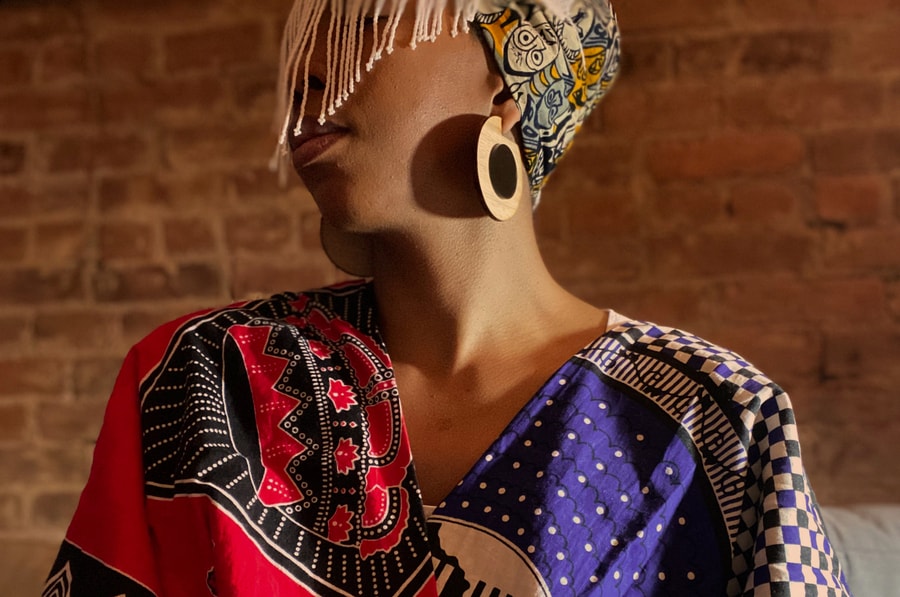Ntokozo Fuzunina Kunene has taken a pause on her costume designs. No elaborate sketches or upcoming collections. Her focus is now giving back to her homeland, South Africa, and fighting for justice for people of color.
Before the shutdown, Kunene had finished up work on Where We Stand at WP Theater with director Tamilla Woodard and was in the process of working with director Logan Vaughn on Stacey Rose’s Legacy Land at Missouri’s Kansas City Repertory Theatre. After Legacy Land closed in previews, she returned to Brooklyn, where she lives, to continue assisting costume designer Dede Ayite on a new opera called Omar. She was then supposed to head to Virginia Stage Company to work on Cat on a Hot Tin Roof. Kunene felt things were lined up for her this year.
“I had sort of been putting out the energies into the universe,” she said. “Really, what I want to do is work more on Black stories, Black spaces, and Black teams.”
Now, with all of those projects on hold, she is finding so-called “little things” to do with her extra time. One: She is helping her mother, who is working out of her hometown of Vosloorus, South Africa, collecting essentials and goods for the Fortune Kunene Primary School, named after Kunene’s grandfather. The school has little or no access to resources, students do not have WiFi, and phone data is too expensive. Many families there have also been displaced due to the shutdown. So Kunene is creating jewelry to sell, with 50 percent of her proceeds being sent back home to her mother.
“We have to give back to where we were initially raised, to the community that got us where we are,” said Kunene, who describes a duty to uphold “ubuntu,” the Zulu word for “humanity.”

Kunene was grateful to participate in the Movement Theatre Company’s 1Move: Des19ned By … program, which commissioned work from 15 foreign-born theatre designers. Her contribution was CU-TA-NE-OUS, a video about what it means to be Black and African during this moment of racial crisis. The opening of her video lists, among other things, the deaths of Ahmaud Arbery, Breonna Taylor, and Nina Pop; the prospect of COVID-19 vaccines receiving trials in Africa; and the mistreatment of Africans in China in the wake of the coronavirus.
“Even before George Floyd,” she said of CU-TA-NE-OUS, “it’s a reminder that as Black people, this was not the wake-up call for us.”

After a discussion with her friends, Kunene also became interested in reparations for Black people in the U.S. She decided to raise funds in support of organizations that invest back into the community. She has raised almost $2,000 for the National Coalition of Blacks for Reparations in America (N’COBRA) in support of H.R. 40, a congressional bill that would create a commission designed to develop proposed forms of reparations as well as consider a “national apology.”
She also would like to find an organization dealing with gender-based violence in South Africa, which has experienced police brutality and racism as well. “While we are fighting these battles, how can we help each other along that isn’t centered around whiteness?” she said. “We can just keep ourselves going and keep ourselves afloat.”
As Kunene encourages her fellow artists to get involved, she sees herself as a true storyteller. “It just so happens that clothing happens to be the medium that I tell my stories,” she said.
If she were to create a piece to represent this time, Kunene said, it would portray the parallels between what is happening in the U.S. and South Africa, while interlocking the past and present. This includes quilted fabric to symbolize interconnectedness, woven techniques for the legacy of the enslaved people and preservation of Black culture, and shades of brown for color. And it would come in the form of armor: the gear Black people wear to shield themselves.
In terms of theatre, Kunene is most interested in structural change, and she said she hopes that things like larger theatre budgets can give costume designers more support and space to affect the industry. Kunene, who is proud to be Black and South African, says that changing people’s hearts and minds is most important.
“We hold on to our hope,” said Kunene, who is staying positive while she looks toward the future. “I think we would have given up a long time ago. But we haven’t.”
Madeline Powell is a Goldring Arts Journalism graduate student at Syracuse University.





